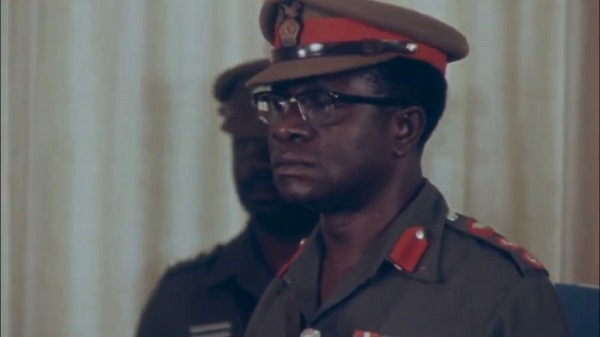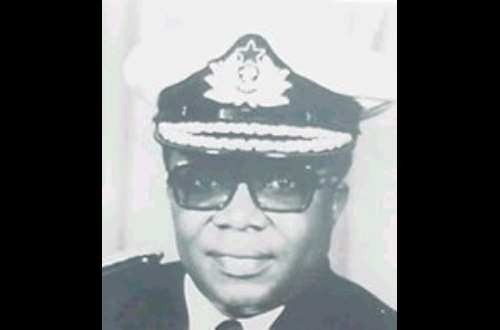Capital Punishment in Ghana: 9 Executions that shook the country
Executions and capital punishment was a legal penalty in Ghana before the abolishment of the death penalty on July 25, 2023.
Prior to the abolishment of the death penalty, capital punishment was a mandatory sentence for certain offences under the law, as a matter of fact, the last execution in Ghana took place in the year 1993.
As of the end of 2021 seven new death sentences were handed down while 165 people were on death row in Ghana.
Legislation tabled by the Member of Parliament (MP) for Madina, Hon. Francis Xavier Sosu, called for the abolishment of the death penalty, with the MP describing this development as a “great advancement of the human rights record of Ghana.
Ghana’s Parliament voted to abolish capital punishment, hence the country’s legal code was amended to replace capital punishment with life imprisonment.
In this piece, The Ghana Report explores some prominent Ghanaians who were executed under the death penalty law.
Lieutenant General Akwasi Amankwaa Afrifa

General Afrifa was seen as young, ambitious, unpredictable, troublesome, and difficult to control.
After the January 13, 1972 military coup, General Afrifa was arrested and detained, for a year.
General Afrifa was again arrested after the June 4, 1979 military coup, and was detained for 3
weeks.
What actually happened at his house during his arrest was witnessed by three men who were by then staying with him. One of them was his then ageing uncle. The others were his personal driver and a young man by the name of Kwame Asante, who attended personally to the former leader.
According to Asante, Afrifa had returned from a trip and was in the bedroom of his storey building sleeping.
He(Asante) woke up from his sleep after a loud noise. He went out only to find the uncle of the former Head of State having an argument with some soldiers, six in number, who wanted to know the whereabouts of Afrifa. He said that a gun was pointed at him when he also went out to ask what was going on. The driver also came out and was added to them.
Asante, who is now an aged man said that the noise woke Afrifa up who then asked from the upper floor the cause of the noise. It was then that his uncle told him some soldiers were looking for him. He enquired why soldiers would come searching for him as early as 3 am.
Asante explained that the staircase to the general’s upper floor was electrically operated by pressing some codes on a control button, meaning with the codes pressed, the staircase lifted up thereby making it impossible for anyone down to have access to the upper floor.
With so much commotion going on, he had no option but to lower the staircase. Asante said the electrically operated staircase had barely touched the floor when the soldiers jumped on Afrifa, grabbed him, pulled him out, threw him to the back of their vehicle and sped off. He asked for the reason for his arrest and was told it was an order. He requested a particular car in his fleet which he used purposely for traveling.
Asante said all the keys to Afrifa’s cars were left in the ignitions. The driver, since he was not properly dressed had dashed into his room to get dressed up so he could drive the former general behind the soldiers. On his return, however, the soldiers were already gone, with Afrifa.
According to him, the incident took place in the early hours of a Saturday morning. They did not hear from Afrifa or even know of his whereabouts only to hear on a BBC news bulletin the following Tuesday that he, together with other soldiers had been executed.
He recalled how the whole town was thrown into pandemonium with people wailing as they made their way to his home.
His offences included the acquisition of loans, property, exploits by virtue of their official position in the public service, illegal acquisition of property, and intentional or reckless damage to public property.
Additionally, he was found guilty of gross negligence or dishonestly applying public property and intentional or reckless dissipation of public property.
All these offences are specified in section three of the AFRC Special Courts Decree.
The shooting started at about 9:30 a.m.
Afrifa was 43 years old when he was killed
General Ignatius Kutu Acheampong

Gen. Ignatius Kutu Acheampong was the military Head of State of Ghana from 13 January 1972 to 5 July 1978 but was deposed in a palace coup.
Ghana’s former leader, Ignatius K. Acheampong, was executed by a firing squad after being convicted of squandering government funds.
The 47-year-old former army general who ruled the country for more than six years stood trial before a revolutionary court set up by a group of junior officers who seized power in a coup.
Lieutenant General Frederick W. K. Akuffo

Ghana’s former Head of State Lieutenant General Frederick W. K. Akuffo was executed along with other senior military officers on 26 June 1979 at the Teshie Military Range, after being convicted of corruption, embezzlement and using his position to amass wealth after a trial by the Armed Forces Revolutionary Council (AFRC).
Major General Robert Ebenezer Abossey Kotei

He was once the Chief of Defence Staff of the Ghana Armed Forces and a member of the Supreme Military Council that ruled Ghana between 1975 and 1979. He was executed in 1979, following a military coup. He also held the Ghanaian high jump record for many years
Lieutenant General Edward Kwaku Utuka

British‐trained officer, Lieut. Gen. E. K. Utuka, former commander of the border guards, was found guilty of squandering government funds the same charges as Ignatius Kutu Acheampong hence executed with him on 16 June 1979.
Admiral Joy Amedume, former Air Force Commander

Admiral Joy Amedume was put on military trial and executed on June 26, 1979, for the acquisition of loans and abuses or exploits by virtue of an official position in the public service.
Among his charges: Illegal or dishonest acquisition of property, and intentional or reckless misapplication or
damage to public property also for gross negligence or dishonestly applying public property and intentional or reckless dissipation of public property.
Air Vice-Marshal George Yaw Boakye

He became a member of the Supreme Military Council (SMC) in November 1976 by virtue of his position as the Commander of the Ghana Air Force. He was executed by firing squad on 26 June 1979.
Kweku Ewusie- A ritual murderer
The Journal of African History documents the ritual murder of a 10-year-old girl in Ghana as far back as WWII.
Her upper and lower lips, cheeks, eyes, and private parts had been removed.
She had gone missing for some time only to be discovered murdered so that her body parts could be used to help the Regent’s faction win a court case that was critical for their political standing in Elmina.
On 24 March, after a preliminary investigation, murder charges were brought against Kweku Ewusie, the Regent of the Edina State, and four others from Elmina: Joe Smith, Herbert Krakue, Nana Appram Esson, alias Joseph Bracton Johnson, and Akodei Mensah.
They were tried at the Accra Criminal Assizes found guilty of first-degree murder, sentenced and hanged.
Benjamin Affi- A ritual murderer
In the case of Benjamin Affi, he contracted men to kill his nephew Kofi Kyinto, a 28-year-old farmer in the Sefwi Bekwai for ritual purposes.
Benjamin Affi witnessed the actual execution of his nephew.
The boy was beheaded by the contract killers under the instructions of Nana Akwasi Agyei of Akaasu.
The culprits were arrested and executed.
Although no Ghanaian president since 1993 has signed the death warrants of convicts placed on death row, Ghana’s High Courts continue to pronounce death sentences on convicts, often in cases of murder.
In the year 2020, three persons were sentenced to death after trial, according to the latest Death Sentences and Executions report of Amnesty International.
The number is the lowest recorded in an entire year in the last decade.
Records from Amnesty International show that the year 2012 saw the highest number of people sentenced to death by Ghana’s courts, 27, since 2010.
Available data from the Prisons Service shows that the majority of those sentenced to death were for the crime of murder and that most of the convicts were men.
Amnesty International’s latest report published on April 21, 2021, found that while executions globally had declined for the third consecutive year, some significant developments such as America’s resumption of executions after 17 years and Egypt’s 300% increase in the number of executions occurred in the year under review.
Within six months in 2020, the Donald Trump administration had executed 10 people.
“The unprecedented challenges of the Covid-19 pandemic were not enough to deter 18 countries from carrying out executions in 2020. While there was an overall trend of decline, some countries pursued or even increased the number of executions carried out, indicating a chilling disregard for human life at a time when the world’s attention focused on protecting people from a deadly virus,” said Amnesty International.
Amnesty International remarked that while countries including Ghana still imposed the death penalty, “the overall picture in 2020 was positive,” with a total of over 483 executions recorded across the world against 2019’s over 657 cases.
By the end of 2020, there were about 160 people on death row in Ghana, five of whom were women.


